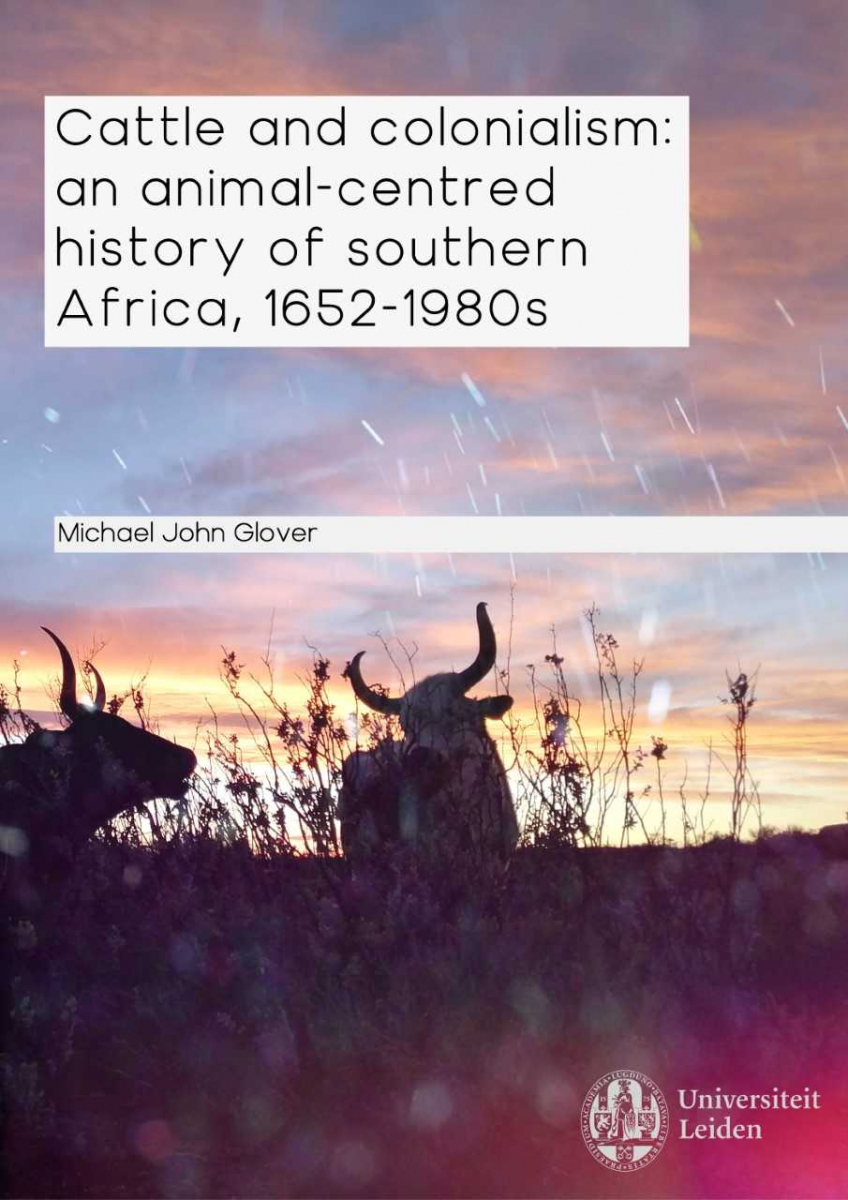PhD Defence Michael Glover: Cattle and colonialism: an animal-centred history of southern Africa, 1652-1980s
 Michael Glover's dissertation is a cattle-centred history of colonialism in southern Africa, principally from 1652 until the 1980s. It opts out of the conventional human-centred approach to historical scholarship. This thesis is located within the broader animal history genre but innovates in that cattle are presented as experiential, sentient subjects in a sustained way. It views colonialism from within an animal-centred paradigm. The thesis explores impacts of colonialism in southern Africa in terms of how colonialism impacted cattle as groups and as individuals. Its primary question is: what are some of the major impacts of colonialism on cattle’s experiences in southern Africa? It is a sustained investigation of how cattle were subjectively impacted by colonialism. Four major impacts of colonialism are isolated and investigated. These are oxen’s wagon labour, disease epidemics and veterinary and state responses to the epidemics, the development of industrial slaughterhouses, and the development of modern colonial cattle breeding regimes. The geographical scope is regional, including present-day Botswana, South Africa, Lesotho, Eswatini, Namibia, and Zimbabwe. The thesis almost exclusively covers the colonial period, from the Dutch East India Company’s arrival at the Cape of Good Hope in 1652 until the 1980s. Diverse evidence is invoked to explore the subjective impacts of colonialism on cattle, including previously unused archival material, official records, architectural designs of slaughterhouses, historical investigations into slaughterhouses in South Africa, eighteenth and nineteenth century travellers’ and missionaries’ accounts, numerous images, and diverse correspondence, for example. The historical investigation takes an interdisciplinary approach by drawing on diverse disciplines to understand cattle’s experiential capacities. The core finding is that colonialism had transformative impacts on cattle history and cattle’s experiences in the region. Additionally, the thesis contends that animal-centred histories are possible, and that historical sources can be interpreted to draw reasonable inferences about cattle’s historical experiences. The thesis argues that understandings of colonialism should be widened to include the ways in which colonialism affected animals.
Michael Glover's dissertation is a cattle-centred history of colonialism in southern Africa, principally from 1652 until the 1980s. It opts out of the conventional human-centred approach to historical scholarship. This thesis is located within the broader animal history genre but innovates in that cattle are presented as experiential, sentient subjects in a sustained way. It views colonialism from within an animal-centred paradigm. The thesis explores impacts of colonialism in southern Africa in terms of how colonialism impacted cattle as groups and as individuals. Its primary question is: what are some of the major impacts of colonialism on cattle’s experiences in southern Africa? It is a sustained investigation of how cattle were subjectively impacted by colonialism. Four major impacts of colonialism are isolated and investigated. These are oxen’s wagon labour, disease epidemics and veterinary and state responses to the epidemics, the development of industrial slaughterhouses, and the development of modern colonial cattle breeding regimes. The geographical scope is regional, including present-day Botswana, South Africa, Lesotho, Eswatini, Namibia, and Zimbabwe. The thesis almost exclusively covers the colonial period, from the Dutch East India Company’s arrival at the Cape of Good Hope in 1652 until the 1980s. Diverse evidence is invoked to explore the subjective impacts of colonialism on cattle, including previously unused archival material, official records, architectural designs of slaughterhouses, historical investigations into slaughterhouses in South Africa, eighteenth and nineteenth century travellers’ and missionaries’ accounts, numerous images, and diverse correspondence, for example. The historical investigation takes an interdisciplinary approach by drawing on diverse disciplines to understand cattle’s experiential capacities. The core finding is that colonialism had transformative impacts on cattle history and cattle’s experiences in the region. Additionally, the thesis contends that animal-centred histories are possible, and that historical sources can be interpreted to draw reasonable inferences about cattle’s historical experiences. The thesis argues that understandings of colonialism should be widened to include the ways in which colonialism affected animals.
Read the dissertation (summary, introduction, conclusion open access; chapters under embargo until 23-05-2023).
Supervisors: Prof. Jan-Bart Gewald (ASCL/Leiden University) and Prof. Ian Phimister (University Of The Free State).
Co-promoters: Harry Wels (ASCL/VU), Charles Foster (University of Oxford).
Date: 23 November
Time: 16.15 - 17.00
Watch this PhD Defence via a live video stream.
Michael is a member of the Collaborative Research Group 'Trans-species perspectives on African Studies'.

